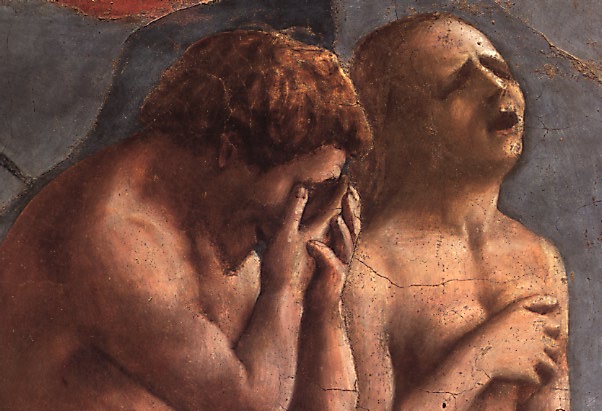Rev. Douglas Whitelaw, M.A. is the executive director of Ark Aid Mission in London, Ontario. This post is from his paper 'Toward A Theology of Suffering'.
SECTION 3/9
SECTION 3/9
_____________________________________________________
The crux of the
matter occurs in the Fall. The systematic theologies will note that God
punished humankind – they like to talk about wrath. But Genesis 3 can be read
not only as the fall into sin but the beginning of the redemption story. If we
read it that way, God's righteousness is recognized but also his covenant love
which ultimately means he is the one who suffers with and for us. Note that
neither Adam or Eve is cursed. Rather, the serpent and the ground are cursed.
The human pair instead hear God describe to them what it will be like for them
in the new environment they created with their disobedience.
Sin first of
all, offends God or rather is an assault on his character because his word
reflects his nature. Sin is serious and God does not overlook it. The cross of
Christ is how God satisfies both his mercy and justice. Erickson says God was
not changed by the Fall and in the classic sense of immutability that may be
so. But God responds to the new situation and he does so lovingly. He would
have been entirely justified in carrying out the death sentence he had
previously warned Adam about and starting over. But he doesn't do that in the
way we might expect. Instead, he seeks
Adam out, tells him the consequences of what he has done and in sending him and
Eve from the garden provides clothing to cover their shame. While a covenant is
not mentioned here, it is evident that God is acting consistently as if there
is one. God is committed to his creature.
Secondly, sin
shatters the created order. Rather than living in a garden, we will live in a
thorny place requiring struggle. Later biblical references elaborate this, most
clearly in Romans 8:20f “for the creation was subjected to futility, not of its
own will but by the will of the one who subjected it, in hope that the creation
itself will be set free from its bondage to decay and will obtain the freedom
of the glory of the children of God” (NRSV). This passage makes clear that God
is committed to his creation, too. Sin bends it almost to the breaking point
but God has a plan to get back what was lost and doing so in a way that his
human creatures, guilty though we are, can
be part of it. This is the story of the rest of the Bible and it is the story
of the unfolding and revelation of God's kingdom, the very thing Jesus
announced had come with him. Evangelical theology barely knows what to do with
kingdom, reducing salvation to personal escape from hell and entry into heaven.
But the redemption story is God getting back, along with the people who he
loves, his rule on the earth. So, the old hymns and the new choruses that long
for escape from this old sinful world will have to go. What Christians are to
be longing for and working for is the release of the creation from 'futility'
and into 'the freedom of the glory of the children of God.' Ultimately, this is
the new heaven and new earth: “The home of God is among mortals, He will dwell
with them as their God; they will be his peoples, and God himself will be with
them; he will wipe away every tear from their eyes; Death will be no more;
mourning and crying and pain will be no more, for the first things have passed
away” (Rev. 21:3-4 NRSV).


